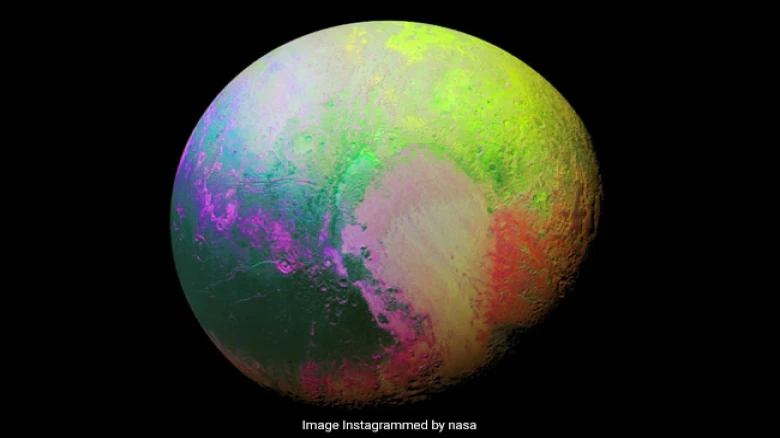International

It went on to say that Pluto's surface is "complex and varied, with jumbled mountains reminiscent of Europa, networks of carved-out valleys, old, heavily cratered terrain sitting right next to new, smooth icy plains, and even what may be wind-blown dunes."
Digital
Desk:
mso-themecolor:text1">United States Space Agency Amazing images from NASA are
frequently posted on its social media channels. The internet was taken aback
when the agency recently posted a rainbow-colored image of a celestial body on
its Instagram account. Pluto is the spherical object that resembles a planet
and is located at the outermost point of our solar system. In the image
released by NASA, Pluto is depicted in various regions with stunning
rainbow-like effects.
"The
rainbow's end is where? Pluto isn't actually a psychedelic riot of colours;
instead, this translated colour image was produced by New Horizons scientists
to emphasise the numerous minute colour variations between the various regions
of the planet "NASA stated in the article.
It went on to say that Pluto's surface is "complex
and varied, with jumbled mountains reminiscent of Europa, networks of
carved-out valleys, old, heavily cratered terrain sitting right next to new,
smooth icy plains, and even what may be wind-blown dunes."
The image was taken by the 2006-launched New Horizons
spacecraft. In the summer of 2015, according to NASA, the spacecraft studied
Pluto and its moons during a six-month flyby. The spacecraft moves deeper into
the Kuiper Belt as it continues to explore the far-off solar system.
Over 7.8 lakh people have liked the post in
just one day. Users can be seen praising Pluto's beauty and the space agency's
choice of colour scheme.
One user commented, "Oh my god, this is
so beautiful." Added another "Congratulations to Pluto on his debut!
Happy for you, buddy."
Pluto's status was downgraded to that of a
dwarf planet by the International Astronomical Union (IAU) in 2019 because it
did not meet the three requirements the organisation uses to define a
full-sized planet.
The IAU defines a full-sized planet as one
that meets the following three criteria: it orbits the Sun, it has enough mass
to assume hydrostatic equilibrium (a nearly spherical shape), and it has
"cleared the neighbourhood" around its orbit. Pluto did not satisfy
the third requirement.
Leave A Comment